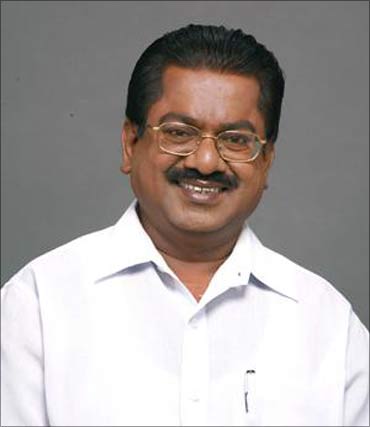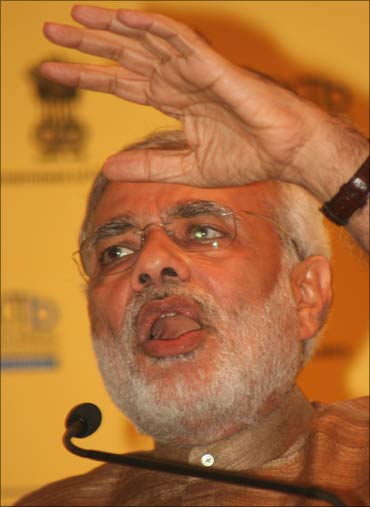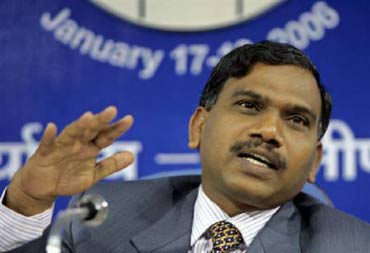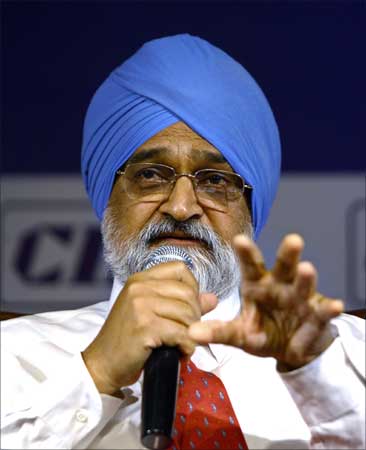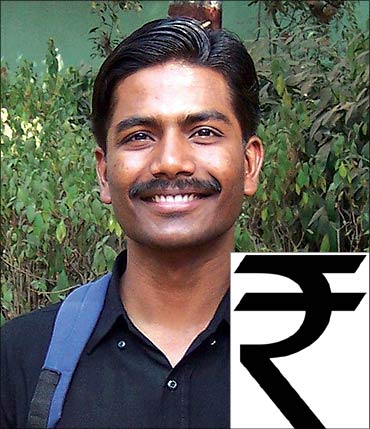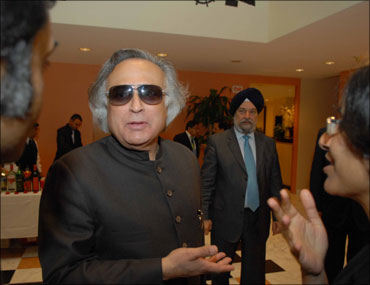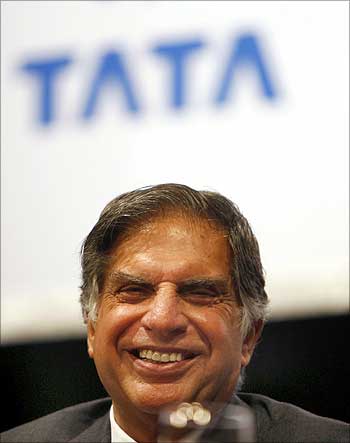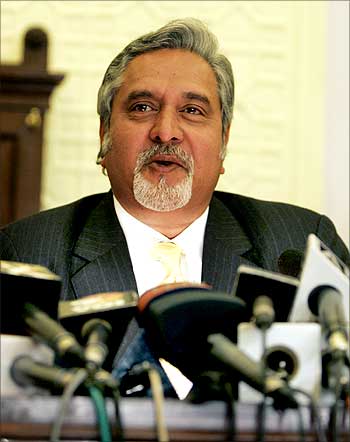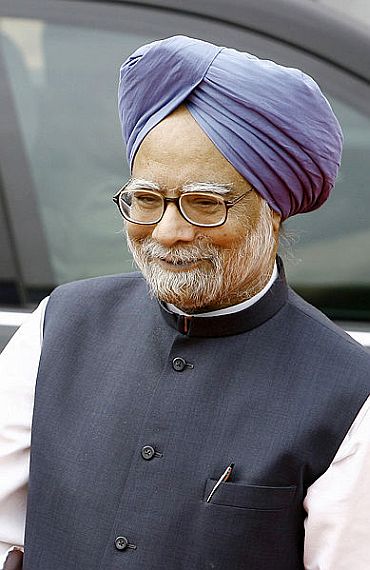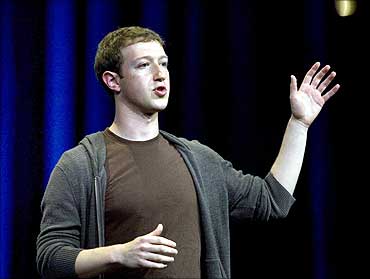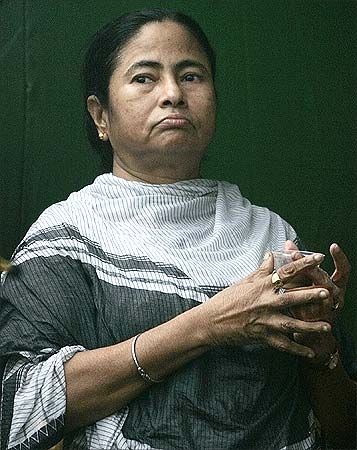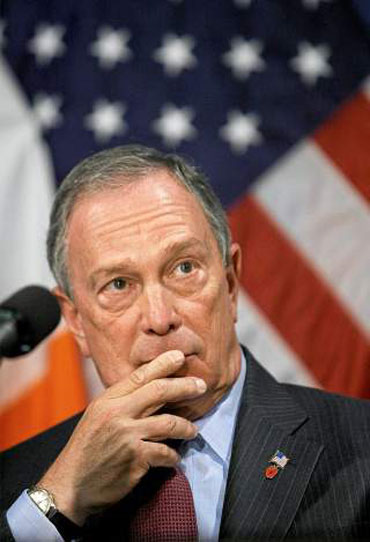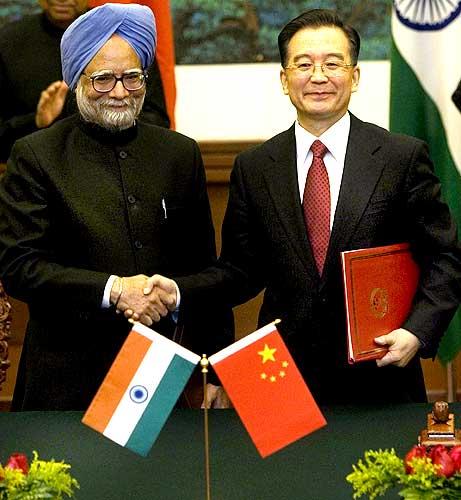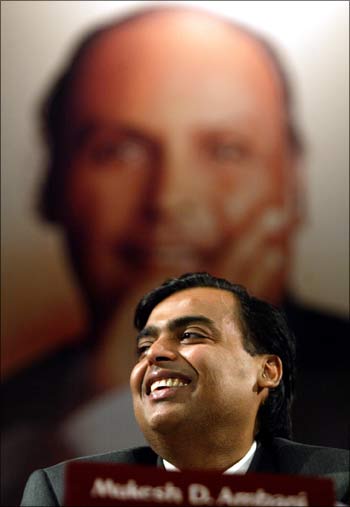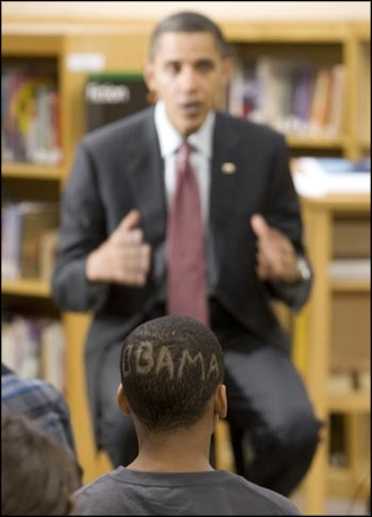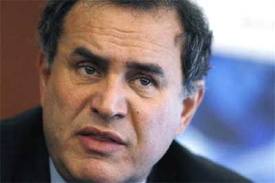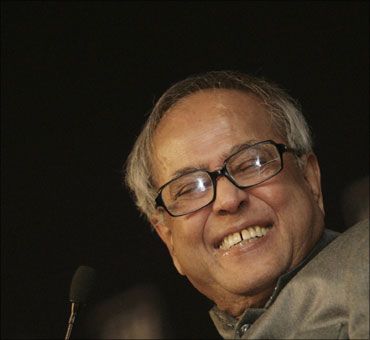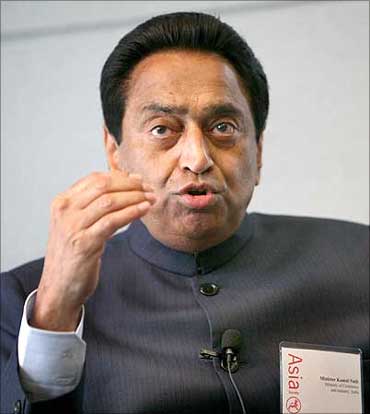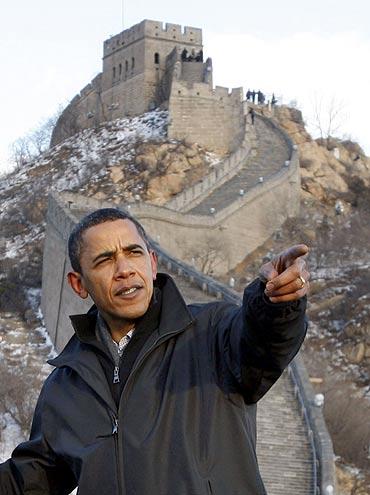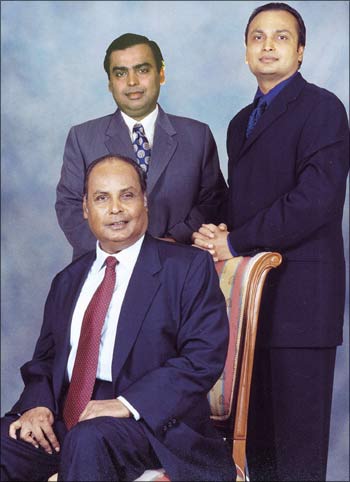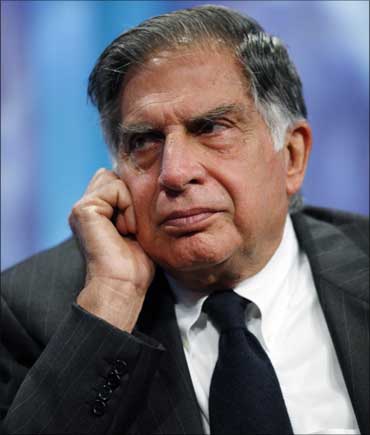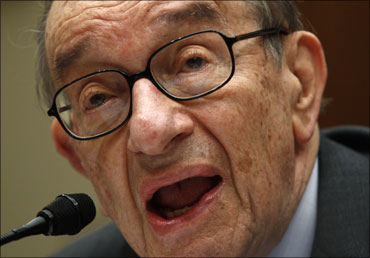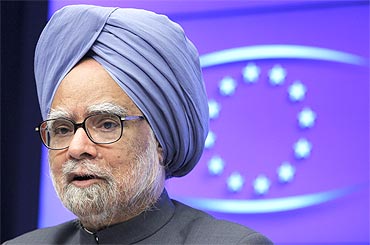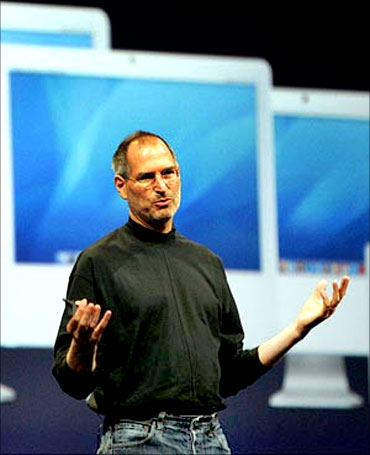 | « Back to article | Print this article |
The zaniest, most jaw-dropping quotes of 2010

India, the year 2010, saw many an upheaval in the often mysterious, at times murky, and occasionally bright world of business, money and economy.
The country was rocked by a plethora of scams of almost every hue that involved mind-boggling amounts of money and a star-cast ranging from politicians to corporate leaders to lobbyists to bureaucrats to media persons.
Investors saw their wealth sea-saw on the stock markets, as the bourses began on a steady note but soon burst through the ceiling touching all-time highs. Foreign institutional investor funds and foreign direct investment levels rose to new record aiding the markets.
While some schisms in the corporate world surfaced with leaders squabbling with each other, some long-standing family battles ended on a quiet note.
The Indian consumer demanded more for less, tourism saw a whole lot more activity this year than any other, and inflation saw prices touch the skies.
And amidst all this drama, corporate leaders and politicians made some of the most serious and often the wackiest of remarks.
Here is a compilation of some of the zaniest quotes of the year 2010.
Click NEXT to read on . . .
The zaniest, most jaw-dropping quotes of 2010

'. . . a small thing like price rise!'
Dravida Munnetra Kazhagam spokesperson and Lok Sabha Member of Parliament T K S Elangovan was recently on a panel participating in a television debate on the disruption of Parliament proceedings by the Opposition parties demanding a JPC probe into the multi-billion-dollar 2G spectrum scam.
Lambasting the Opposition over wasting public money and denigrating democracy, Elangovan said: "Even during the last session, the Opposition had disrupted Parliament for three-four days over a small thing like price rise."
Small thing like price rise?!! Something that affects the poorest the most is a small thing for some of our politicians.
Click NEXT to read on . . .
The zaniest, most jaw-dropping quotes of 2010

'Scam hota hi kyun?'
Gujarat Chief Minister Narendra Modi recently said that the 2G spectrum scam would not have taken place had he been the prime minister.
"Hota hi kyun (Why would it have happened at all)?" Modi said when asked how he would have tackled the scam had he been the prime minister.
Click NEXT to read on . . .
The zaniest, most jaw-dropping quotes of 2010

'I will not resign'
Undeterred by the mounting opposition attack on his role in 2G spectrum allocation, former telecom minister A Raja for a very long time ruled out his resignation over the Rs 176,000 crore (Rs 1.76 trillion) 2G spectrum allotment scam, saying he will prove that everything has been done according to the law.
"I will not resign. The question does not arise at all. We will prove that everything has been done according to the law.
The DMK too strongly defended Raja, saying there was no need for him to step down as he went by the TRAI norms.
On November 14, 2010, however, Raja resigned. But he still continues to strike a defiant note despite his indictment by the CAG over the 2G spectrum allocation.
"I have not done anything wrong. I am ready for a probe. No problem at all," Raja said.
Click NEXT to read on . . .
The zaniest, most jaw-dropping quotes of 2010

Housing loan scam? 'It's a very small incident'
The Planning Commission termed the housing finance racket, involving the chief of LIC Housing Finance and several other officials of PSU banks, as a 'very small' incident as far as banking system as a whole was concerned.
Planning Commission Deputy Chairman Montek Singh Ahluwalia said: "I do not think we should make too much of a particular incident (housing scam)...the scale (size of the scam) we are talking about. . . is very small as far as banking system as a whole is concerned."
Click NEXT to read on . . .
The zaniest, most jaw-dropping quotes of 2010

'It is a great honour to be a part of India's history'
On July 15, 2010, D Udaya Kumar became more famous than most Indians. He has achieved celebrity status after his design for the Indian rupee currency was approved by the government.
"It is a great honour to be a part of India's history," said an excited Udaya while speaking with rediff.com.
Click NEXT to read on . . .
The zaniest, most jaw-dropping quotes of 2010

'You need help'
India's controversial Bt brinjal saga has been a prickly issue confronting its agriculture with emotions running high.
For the man in the hot seat -- Jairam Ramesh -- who determined whether the country is ready to embrace genetically modified food crops or not, it was jumping out of the frying pan into the fire.
Caught between pro- and anti-Bt brinjal groups, the minister was once accused of being 'Hitler-like' during public consultations when he was also heckled on a few occasions
Ramesh, who was criticised by groups against commercialisation of Bt brinjal, shouted at a meeting in Bangalore, saying: "I will not listen to you." In Kolkata too, at a similar meeting, Ramesh shouted down protestors.
He lost his cool more than once when he was accused by one of being an 'agent' of biotech firm Monsanto. "I am not a Monsanto agent," a livid Ramesh snapped. "You need help," he said, implying that the participant was mentally unsound.
As the debate grew louder, Ramesh said: "This is not Parliament. They must stop telecasting parliamentary proceedings... This is highly infectious."
Some time ago, Ramesh was again in the news for all the wrong reasons. He described the practice of wearing the traditional robe at convocation ceremonies as a 'barbaric colonial relic', and publicly removed his own gown. The students gathered there are reported to have cheered this gesture.
He said that the convocation should be conducted wearing a simple dress instead of "dressed up as medieval vicars and popes".
The remark hurt the Christian community and a Bangalore-based Christian group said that the minister had deeply offended religious sentiments of the Christian community in India. The group also wanted Ramesh to apologise for his statements.
Click NEXT to read on . . .
The zaniest, most jaw-dropping quotes of 2010

'Stop banana republic kind of attacks'
"Stop this sort of banana republic kind of attacks on whoever one chooses to attack on a basis unsubstantiated, even before the person has in, what I consider, every Indian's right namely to be considered innocent, until found guilty in a court of law, not on the street, not in this way."
"I didn't use the term 'Banana Republic' lightly. Banana Republics are run on cronyism. The danger is that you could degenerate into that kind of atmosphere unless the necessary parts of government play their role in upholding the law. And fine, no one be above the law. I would happily have that happen, whereas certain people might not like to see that happen."
The media "is going crazy in alleging, convicting and executing" people on the basis of a flood of unauthorised tapes.
"It is a murky time. It's a confusing time for me because just a couple of weeks ago, we were sitting on top of a summit, with President Obama showering praise on what we had done, talking about maturity, talking of us having emerged and not being an emerging force. And then we have somewhat slipped into a series of allegations," he said.
"And then we have somewhat slipped into a morass of series of allegations, unauthorised tapes being flooded, the media going crazy on alleging, convicting, executing. You are literally character assassinating."
Click NEXT to read on . . .
The zaniest, most jaw-dropping quotes of 2010

High airfares: 'This is not exploitation by airlines'
Protesting against the government efforts to reduce high prices charged by airlines on tickets booked at short-term notice, Kingfisher Airlines promoter Vijay Mallya said that airfares should not be capped by the regulatory authorities, whether it is in upper or lower band.
"There is no case of capping airfare in a liberalised environment, be it at upper or lower band. It is a function of demand and supply. It is not exploitation by the airlines. Airlines are fighting for market share, so demand and supply has to be respected," he said.
Click NEXT to read on . . .
The zaniest, most jaw-dropping quotes of 2010

'India is not in the business of stealing jobs'
"As far as India is concerned, India is not in the business of stealing jobs from the US. Outsourcing industry, I believe, has helped to improve the productive capacity and productivity of American industries," Prime Minister Manmohan Singh said when US President Barack Obama was visiting India last month.
Click NEXT to read on . . .
The zaniest, most jaw-dropping quotes of 2010

'Email will die'
"Email will follow the fate of postal letters, which paved the way for e-mails," Mark Zuckerberg, founder of social networking giant Facebook.
Calling it slow and informal, he said the e-mail usage has already declined and the modern world is out of e-mails.
Zuckerberg, one of the world's youngest billionaires with an estimated wealth of over $6 billion, also said: "With a generation of younger folks who have thrived on the success of their companies, there is a big opportunity for many of us to give back earlier in our lifetime and see the impact of our philanthropic efforts."
Click NEXT to read on . . .
The zaniest, most jaw-dropping quotes of 2010

'I will make Singur the showpiece of Bengal'
Roughly two years after the Tatas pulled the Nano project out of Singur, Railway Minister and Trinamool Congress chief Mamata Banerjee said at a rally recently, "I will make Singur the showpiece of Bengal."
"Singur is like my eyeball and Nandigram my heartbeat," Mamata said, the deserted sheds of the Tata Motors car factory in the background.
The Trinamool Congress chief sounded almost desperate to take land for setting up industry.
She also pooh-poohed the Left Front's suggestion for returning 100 acres in Tata Motors' abandoned land at Singur to help in restarting an industry there and alleged that the state government was "land scam-tainted".
"The government is absolutely corrupt, land scam-tainted and blacklisted," Banerjee said.
Click NEXT to read on . . .
The zaniest, most jaw-dropping quotes of 2010

'If they burn the garbage, how will we eat?'
Two Indian ragpickers took their protest against loss of livelihood to rubbish-guzzling incinerators to Cancun, seeking a role in the Global Climate Fund as they underlined the importance of recycling to combat rapid climate change.
Vatsala Gaikwad and Supriya Bhadakwad from Maharashtra hopped on a plane for the first time to protest about the loss of their jobs to rubbish-guzzling incinerators which pump out carbon dioxide, on their way to UN climate conference in Cancun, Mexico.
These women assert that since the municipal corporation takes the garbage directly to incinerators owned by private companies, their livelihood of picking garbage is being destroyed.
"Our livelihood is being taken away and thousands of people are suffering losses....if they burn the garbage then we can't earn...where will our daily meals come from and how will we eat," said 54-year-old Gaikwad from Mumbai.
"Our work is environmentally friendly but these burning places increase the pollution," she added.
These women represent communities, which for generations have made their living from separating different kinds of rubbish from landfills across the country.
Much of what they collect like - plastic bottles, aluminium and paper - can be recycled.
But increasingly, heaps of garbage is being taken to incinerators, which disposes of the waste quickly and cuts out the option of recycling.
"We're concerned about the environment and about employment," said 34-year-old Bhadakwad from Pune.
"The material that can be recycled is also destroyed in these machines," she said.
They were both part of the Global Alliance of Wastepickers and wanted to be included in the Global Climate Fund, which has been established to give out money for various projects and policies to facilitate adaptation to climate change.
Click NEXT to read on . . .
The zaniest, most jaw-dropping quotes of 2010

'Reality of wealth is that you can't take it with you'
New York mayor Michael Bloomberg on deciding to give away a major portion of his wealth for charity:
"One of the senior managers at my company, Bloomberg LP, recently told me that part of his new hires recruiting pitch is to ask, "What other company can you work for where the owner gives nearly all the profits to charity?
"Nothing has ever made me prouder of my company than that one story.
"In the 1990s, a generous individual planned to leave Johns Hopkins University, my alma mater, $50 million upon his death.
"But I asked him: Why wait? Why deny financial aid to this generation? Why deny a possible cure for a disease to this generation? That convinced him - and he gave the money right then and there.
"As I wrote in my autobiography around that same time, the reality of great wealth is that you can't spend it and you can't take it with you."
Click NEXT to read on . . .
The zaniest, most jaw-dropping quotes of 2010

'World is large enough for both India and China'
"The world is large enough to accommodate the growing ambitions of both India and China," Prime Minister Manmohan Singh said recently.
The prime minister said that both the Asian giants are very fast growing economies, and Beijing is New Delhi's largest trading partner. While India welcomes competition from China, enormous possibilities of working together too exist, he added.
Click NEXT to read on . . .
The zaniest, most jaw-dropping quotes of 2010

'Think of Reliance when you fly or drive a car'
"We process about 2 per cent of the world's transportation fuels. So, whenever you fly or drive a car or things move in a truck, think about Reliance," RIL chairman Mukesh Ambani said at an awards function in New York recently.
Click NEXT to read on . . .
The zaniest, most jaw-dropping quotes of 2010

'A megaleak on US bank soon'
The just-out-on-bail WikiLeaks founder Julian Assange said a few days ago that his group planned to release tens of thousands of internal documents from a major US bank early next year.
WikiLeaks' next target will be a major American bank. "Yes. We have one related to a bank coming up, that's a megaleak. It will give a true and representative insight into how banks behave at the executive level in a way that will stimulate investigations and reforms, I presume," said Assange in an interview with Forbes, adding: "For this, there's only one similar example. It's like the Enron emails."
Click NEXT to read on . . .
The zaniest, most jaw-dropping quotes of 2010

'Anyone with talent can succeed in the US'
The United States is a country where anybody with a good idea can prosper and anyone with talent can succeed, President Barack Obama has said.
"That's not just the power of science. That's the promise of America. Anybody with a good idea can prosper. Anybody with talent can succeed," Obama said on Monday in his remarks after meeting a group of science students, two of whom were Indian-Americans, invited by the White House from across the country.
Click NEXT to read on . . .
The zaniest, most jaw-dropping quotes of 2010

'I didn't want to set up an airline by paying a bribe'
Tata Group chairman Ratan Tata on Monday said he did not enter the airline business as he was not comfortable with the idea of bribing a minister, as had been suggested by an industrialist.
He regretted that despite being a pioneer in the airline industry, the group faced enormous problems in setting up a domestic airline in collaboration with Singapore Airlines.
"We approached three prime ministers also. But an individual thwarted our efforts to form the airlines," Tata said, recalling how he spurned the suggestion by a fellow industrialist.
He, however, did not name the individual.
Amid Tatas' efforts to set up a joint venture with Singapore Airlines, a fellow industrialist had said: "You are stupid people. The minister was asking for Rs 15 crore (Rs 150 million). Why didn't you pay the money?"
Narrating the incident, Tata said, "I did not want to go to the bed knowing well that I set up an airline by paying Rs 15 crore."
Click NEXT to read on . . .
The zaniest, most jaw-dropping quotes of 2010

'India can surpass China'
Noted global economist Nouriel Roubini, who had predicted the global recession of 2008 in 2006, said that India had the potential to overtake China in economic growth.
"In the next few years, it is possible that the growth of India might surpass that of China, with India maintaining a close to double-digit growth, while China might slow down to eight per cent or so," said Roubini.
Click NEXT to read on . . .
The zaniest, most jaw-dropping quotes of 2010

'Europe recovery important for India'
"The recovery -- rather rapid and robust recovery -- of Europe is important from India's point of view as a sizable percentage of Indian exports are destined towards Europe," Finance Minister Pranab Mukherjee said.
Commenting on the housing loan scam, the finance minister recently asked banks and financial institutions, which have exposure to companies involved in the multi-crore rupee housing finance racket, to ensure that investor money is safe.
"I have instructed banking and financial institutions to look into all these issues and they should ensure that institutions' money is saved," he said.
Click NEXT to read on . . .
The zaniest, most jaw-dropping quotes of 2010

'We have bad roads because of rains'
Under attack from Members of the Parliament, Surface Transport Minister Kamal Nath recently sought to blame the excess rains this year for bad condition of roads in some parts of the country.
"It is true that the condition of highways is not good in some parts. This year we had excess rains," Nath said.
Click NEXT to read on . . .
The zaniest, most jaw-dropping quotes of 2010

'We are against protectionism'
United States President Barack Obama during his India visit said that his country was against protectionism and would work with India to make global economic recovery strong and durable.
In his address to Members of Parliament, Obama said: "Together, we can resist the protectionism that stifles growth and innovation. The US remains - and will continue to remain - one of the most open economies in the world."
Click NEXT to read on . . .
The zaniest, most jaw-dropping quotes of 2010

'Reliance split good for India'
The split in the Reliance empire caused by differences between the two scions -- Mukesh and Anil Ambani -- five years ago has been good for the country as it has unlocked a lot of value, the author of a newly-released book on the family said.
"Overall, its been better for India. The split has been good for the share-market, it has unlocked a lot of value and helped entrepreneurship," journalist Hamish McDonald said while promoting his new book Ambani & Sons in New Delhi.
The book is McDonald's second on the Ambani family, whose rise to the top of India Inc has been meteoric.
Click NEXT to read on . . .
The zaniest, most jaw-dropping quotes of 2010

'The right person, and not anti-Parsi or pro-Parsi will lead Tata Group'
"The Tata Group is an Indian group and we should not be looking (at it) as a Parsi group. The successor should be the right person and not anti-Parsi or pro-Parsi," Ratan Tata told shareholders at Tata Chemicals' annual general meeting in Mumbai recently.
Click NEXT to read on . . .
The zaniest, most jaw-dropping quotes of 2010

'30% chance of double-dip recession in the US'
The chances of the United States economy slipping into another recession are close to 25-30 per cent, a noted American economist said.
"I see a third to fourth of a chance of a double-dip (in the US economy)," noted American economist and former chairman of the Federal Reserve of the United States, Alan Greenspan, said while addressing an audience through video-conferencing during an award function in Mumbai recently.
Click NEXT to read on . . .
The zaniest, most jaw-dropping quotes of 2010

'Ethical deficit in some companies'
Amid charges for flouting environment laws by some influential business houses, Prime Minister Manmohan Singh on Tuesday said there was a perceived 'ethical deficit' among some corporates which need to follow fair means in their pursuit.
"I am sure, business leaders are aware that business practices of some corporate houses have recently come under intense public scrutiny for their perceived ethical deficit," he said while addressing captains of industry at India Corporate Week 2010 function in New Delhi.
Click NEXT to read on . . .
The zaniest, most jaw-dropping quotes of 2010

'iPad to be notebook killer'
"The iPad is clearly going to affect notebook computers," Apple founder Steve Jobs said.
"I think the iPad proves it's not a question of 'if' but a question of 'when'," Jobs said, commenting on the phenomenal success of the Apple's latest hit.
Click NEXT to read on . . .
The zaniest, most jaw-dropping quotes of 2010

'Inflation will drop by December. . . er, March . . .'
Politicians, bureaucrats, economists and analysts of all shapes and sizes have been repeating this very sentence for the last two years.
Every time prices start to rise and essential goods begin to slip out of reach of the aam aadmi, we hear a whole lot of intelligent, serious-looking, no-nonsense 'experts' making this statement to the press. And the press, true to its habit, never ceases to parrot what these experts say.
'Inflation will drop to 5 per cent (or is it 6 per cent) by December' is the phrase these experts use the whole year round, except when in November the rate shows no sign of listening to them.
So they simply change the month and buy time. 'Inflation will drop to 5 per cent (or is it 6 per cent) by March. . . '

